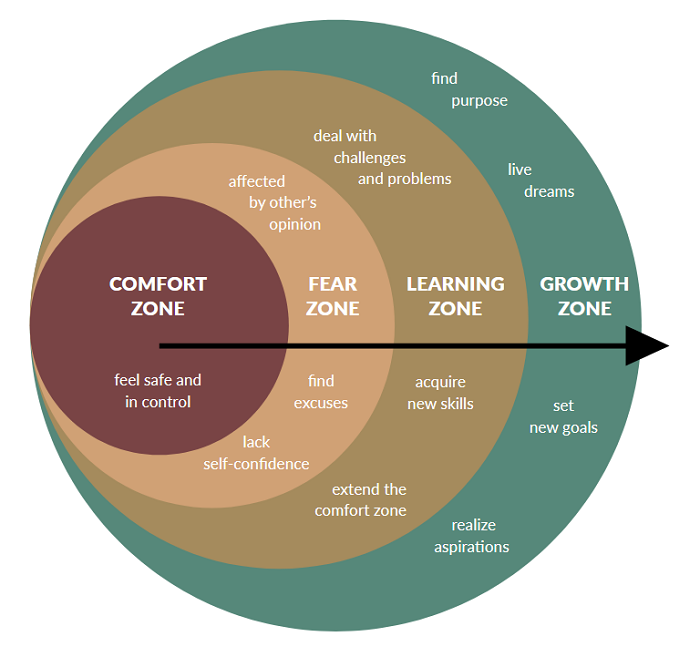Technique 1.156 Moving Outside Your Comfort Zone
Introduction
The comfort zone is where you explore only things you know, or you feel you know, and can control.
Going outside your zone of comfort requires a growth mindset that can be developed by dedication, hard work, intellect, natural talent, a love of learning, contributing to accomplishment and success, etc . However,
"...having a growth mindset is not sufficient; a growth mindset must be translated into action..."
Hugo Alberts et al, 2023
This means that you could fail, make mistakes, use skills not fully mastered, etc as part of learning and development.
To learn and grow, you must venture beyond the comfort zone into the fear zone. The fear zone is both
"...scary and uncomfortable. It is the zone that prevents most people ever leaving a comfort zone..."
Hugo Alberts et al, 2023
The more you enter the fear zone and reap its benefits, the easier and more attractive it is to do it again.
Everybody at some time in their lives as tried something new; this means stepping out from your comfort zone, ie where feel safe and in control as everything comes easy to you
This technique is designed to help people understand the cost of staying in the comfort zone and the importance to leave it so that you experience growth and development.
(for more detail, see framework 132 p. 2385)
Setting the scene
i) understanding their growth and fear are part of the development, learning process, ie
"...cannot grow without experiencing fear. Highlighting the notion that fear is virtually a pre-requisite for growth and learning..."
Hugo Alberts et al, 2023
Using the cost of staying in the comfort zone as a motivation to move into the fear zone and the necessity of accepting fear.
ii) the difference in sizes of each zone (the comfort zone is much smaller than the fear of the learning and growth zones are bigger; this highlights
"...the limited nature of living within one's small comfort zone and the possibility of enduring relatively minor fears zone in the service of bigger and better things..."
Hugo Alberts et al, 2023
iii) mistakes, failures, etc will happen ( this is part of learning and involves struggle and discomfort:
"...the experience of failing or finding something difficult allows clients to progress with learning..."
Hugo Alberts et al, 2023
iv) progress of learning and growth is not linear (it is highly dynamic and continuous; you can move between the zones, eg re-enter the fear zone when new, unforeseen challenges occur; once you reach the growth zone, it creates a new comfort zone and the process repeats itself)
v) learn from other experiences (understand and learn from previous movements between the zones in different situations)
The diagram below describes each zone in more detail
(source: Hugo Albert et al, 2023)
Steps
i) comfort zone (identify a current comfort zone situation by describing something you would like to do but fear is holding you back)
ii) fears zone (identify and list your personal signs of fear, ie
- What you would you experience if you were to step outside your comfort zone into the fear zone?
- What characterises your fear?
"...for instance, would you feel anxious, notice your heart beating faster, feel a lack of self-confidence, will have critical thoughts, such as 'I cannot do this' or 'I'm not smart enough for this'?
Hugo Albert et al, 2023)
iii) learning zone (identify and list opportunities for learning, ie
- What are you missing out by staying within your comfort zone?
- If you don't endure the fear zone, what opportunities for learning would you miss?)
iv) growth zone (identify and list your potential long-term growth by considering the potential for growth in the learning zone, ie professionally and personally)
- What have you gained from this activity?
Summary
"...We all have a comfort zone within which we feel safe and in control and where things come easy for us. Life seems good in a comfort zone because there is little to be afraid of or worried about, and there is a low risk of failure or rejection or any other unpleasant experiences. However, the problem with living life in our comfort zone is that there is little, if any, room for growth and learning. Growth and learning come only from venturing beyond the comfort zone..."
Hugo Alberts et al, 2023
